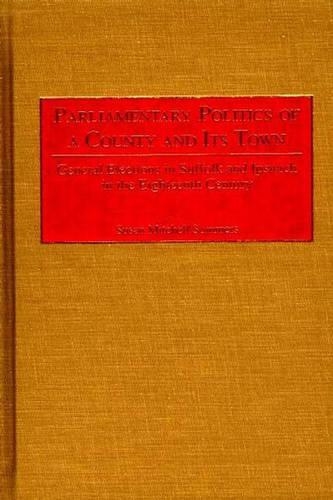
Parliamentary Politics of a County and Its Town: General Elections in Suffolk and Ipswich in the Eighteenth Century
(Hardback)
Publishing Details
Parliamentary Politics of a County and Its Town: General Elections in Suffolk and Ipswich in the Eighteenth Century
By (Author) Susan M. Sommers
Bloomsbury Publishing PLC
Praeger Publishers Inc
30th June 2002
United States
Classifications
Tertiary Education
Non Fiction
Elections and referenda / suffrage
News media and journalism
324.9426407
Physical Properties
Hardback
242
Description
Examines the increasing sophistication and independence of the provincial electorate as reflected in the development of the press as a political venue and instrument open to all voters. Based on archival sources, this study considers political activities in Suffolk's two main constituencies over the course of the 18th century. Mining the records of an unusually rich provincial press, Sommers addresses many key questions of Hanoverian political historiography: the press, popular political expressions, women in politics, deference, and elite behavior. She focuses primarily on the second half of the century, a time marked by an increasingly sophisticated electorate that left considerable documentary evidence, to determine how politics actually developed in East Anglia, as recorded in public and private documents. In addition to a description of the variety and nature of Suffolk politics, the work elaborates upon a number of important collateral themes. These include the appearance of intense political awareness and enthusiastic participation in popular activities among those not possessing the vote, coupled with a political use of the press that grows dramatically in scope over the course of the century. Other sections detail the sustained development of the independence of the electorate and the connection between religious affiliation and partisan identification locally, as well as that between local and national parties.
Reviews
"This valuable contribution to the electoral history of Britian in the long eighteenth century, is a lucid, scholarly, and well-balanced account of its subject, based on detailed reading of a wide vareity of local sources. Eighteenth-century Suffolk is a county that has received little published attention from scholars....[S]usan Mitchell Sommer's book will be warmly welcomed."-The Historian
[A] carefully researched piece of scholarship.-Albion
[T]he author should be commended for having tackled the extensive local primary sources, particularly newspapers, election pamphlets and private correspondance, so comprehensively. The complex nature of local political power struggles, the relationship of the local land elite withe the administration and both houses of parliament, and the art of electioneering are all demonstrated, as is the changing influence of dissent on elections....This book makes a valuable contribution to psephological debates on the effects of religion, freemasonary, and the developing political press, among other issues, as well as getting to grips with the, at times, complicated narrative of Suffolk politics, without reviving old arguments that have become part of history themselves.-Parliamentary History
This valuable contribution to the electoral history of Britian in the long eighteenth century, is a lucid, scholarly, and well-balanced account of its subject, based on detailed reading of a wide vareity of local sources. Eighteenth-century Suffolk is a county that has received little published attention from scholars....[S]usan Mitchell Sommer's book will be warmly welcomed.-The Historian
[A] carefully researched piece of scholarship.Albion
"A carefully researched piece of scholarship."-Albion
"The author should be commended for having tackled the extensive local primary sources, particularly newspapers, election pamphlets and private correspondance, so comprehensively. The complex nature of local political power struggles, the relationship of the local land elite withe the administration and both houses of parliament, and the art of electioneering are all demonstrated, as is the changing influence of dissent on elections....This book makes a valuable contribution to psephological debates on the effects of religion, freemasonary, and the developing political press, among other issues, as well as getting to grips with the, at times, complicated narrative of Suffolk politics, without reviving old arguments that have become part of history themselves."-Parliamentary History
"[A] carefully researched piece of scholarship."-Albion
"[T]he author should be commended for having tackled the extensive local primary sources, particularly newspapers, election pamphlets and private correspondance, so comprehensively. The complex nature of local political power struggles, the relationship of the local land elite withe the administration and both houses of parliament, and the art of electioneering are all demonstrated, as is the changing influence of dissent on elections....This book makes a valuable contribution to psephological debates on the effects of religion, freemasonary, and the developing political press, among other issues, as well as getting to grips with the, at times, complicated narrative of Suffolk politics, without reviving old arguments that have become part of history themselves."-Parliamentary History
Author Bio
SUSAN MITCHELL SOMMERS is an Associate Professor of History at St. Vincent College in Latrobe, Pennsylvania and currently serves as Regional Sub-Editor for The Historian.
